Best
Beginner
Trumpet
AND PROFESSIONAL MODELS
-
Overall: Durable Construction Made Of Yellow Brass
-
Best Feature: The Adjustable 3rd Trigger Ring Ensures A Comfortable Grip
-
TedScore™: 8/10
Best
Overall Trumpet
-
Overall: One-Piece Hand-Hammered Bell For An Epic Tone Quality
-
Best Feature: Monel Alloy Pistons For A Smooth And Groovy Action
-
TedScore™: 9/10
Best
Intermediate Trumpet
Intermediate
Bb Trumpet CLASSIC SILVER TRUMPET
-
Overall: Medium-Large Bore For A Warm And Rich Sound
-
Best Feature: Silver-Plated Finish For A Classic Look And Feel
-
TedScore™: 8.5/10
Have you ever thought, “Is trumpet hard to learn?” as you looked at that shiny, brass instrument with curiosity?
I certainly have! It’s like admiring a shiny sports car and wondering if you can handle it—except here, it’s all about playing those lively tunes.

But wait, learning the trumpet requires skills, patience, and lip strength. But don’t worry; picture the sound of a victorious fanfare when you finally hit that high note—that could be you!
Let’s be real, who wouldn’t want the superpower of making music with just a breath and a buzz?
Keep reading, as we’re about to hit the high notes (literally), and find out what it takes to start your trumpet-playing journey.
It’s going to be so much fun!
Mastering the Basics
When I first picked up the trumpet, I realized that nailing the fundamentals was vital. Let’s unpack the crucial elements: embouchure, breath control, and valve work.
Developing Embouchure
Creating the trumpet embouchure is critical. It’s like sculpting the perfect tool to carve out the sound, which is how I shape my lips and facial muscles.
Starting out, I need to form a small, round opening with my lips and press the mouthpiece against them just enough to create a seal.
Picture a buzzing bee—that’s the sound I aim for. It’s all about finding that balance without excessive pressure, which can swiftly tire out my chops.
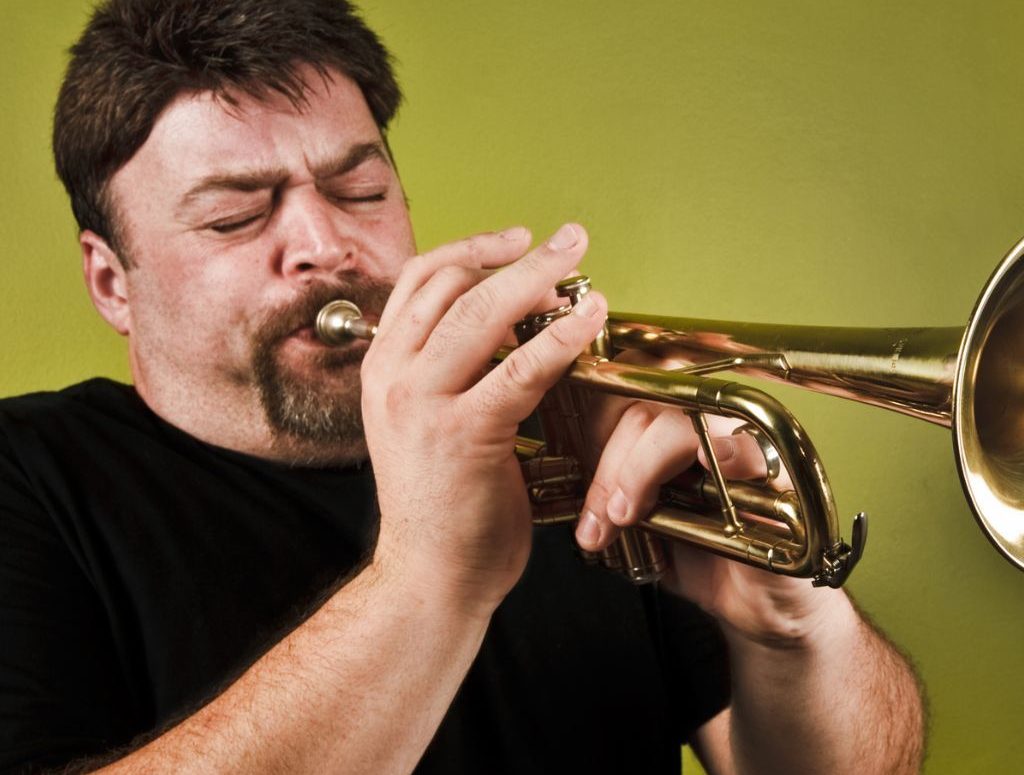
Breath Control and Posture
Breath control is vital; I think of my breath as the wind that sails a ship.
I must take deep breaths and use my diaphragm to support the airflow. Good posture complements this; standing or sitting straight expands my lungs.
It’s all about ensuring my breath goes the distance and powers my performances from start to finish, like a perfectly tuned engine.

Finger Positions and Valves
The valves are the heart of changing notes on the trumpet. Aligning my fingers correctly and moving them precisely is the secret to unlocking all those melodies.
The first valve drops the pitch by a whole tone, the second by a semitone, and the third by one and a half tones. Think of them as little levers that I’m coordinating with ninja-like agility.
It’s a dance where my fingers need to tap confidently and gracefully, like performing a ballet on a tiny stage.
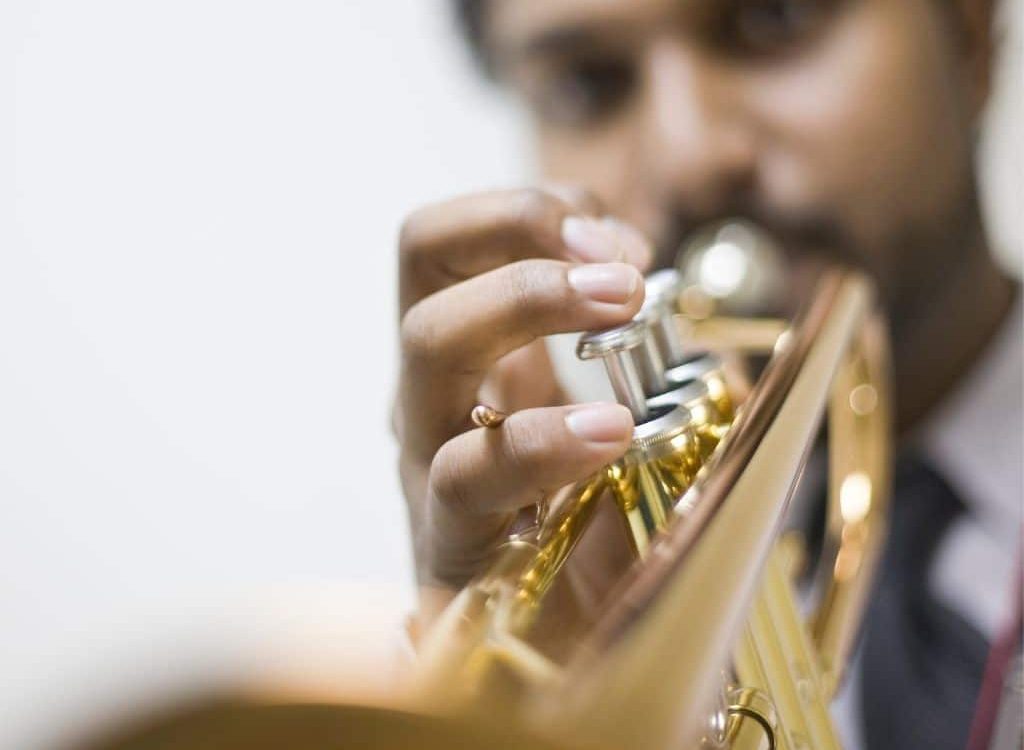
Effective Practice Strategies
In my musical journey, I’ve discovered that quality practice is the secret to mastering the trumpet.
Let’s explore how to nurture your trumpet talent with intelligent, effective strategies.
Routine and Consistency
Creating a practice routine is like setting up a daily rendezvous with my trumpet, and it’s utterly non-negotiable for progress. I carve out chunks of time every day, as consistency is paramount.
Methodical Learning
I break down my practice into manageable pieces, focusing on one aspect at a time. It might be scales one day or a tricky passage the next.
This makes my practice more digestible and markedly more efficient— ticking off goals as I go!
Utilizing Resources
In this splendid age of technology, I’ve got an array of resources at my fingertips.
YouTube has countless tutorials, and I can’t champion the use of videos enough— they bring a pro proper into my living room. Books, too, offer a treasure trove of knowledge and exercises that I delve into to enrich my practice sessions.
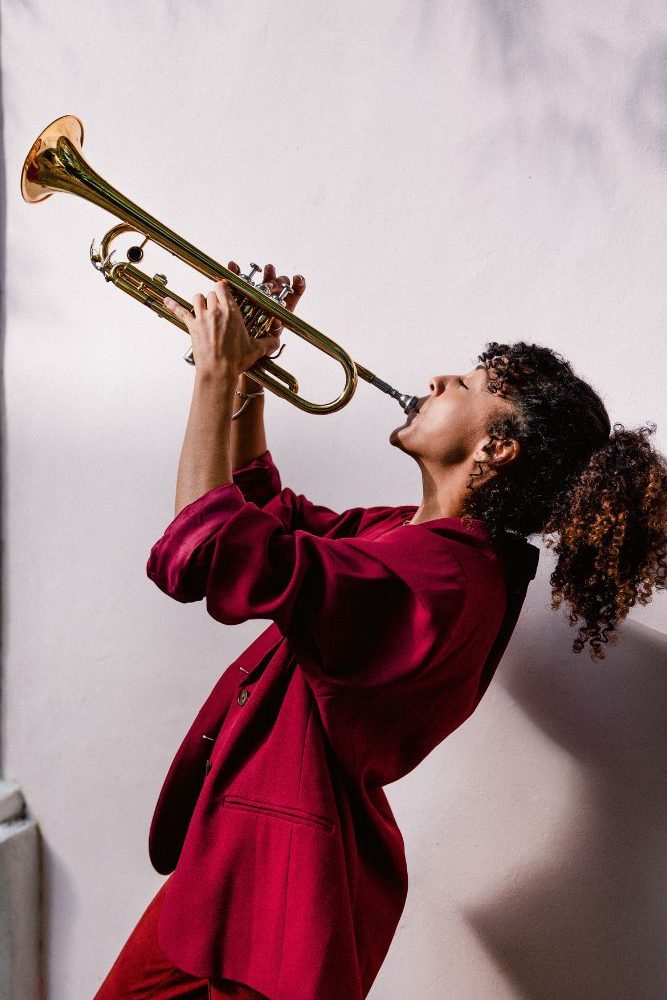
Getting Started
with the Trumpet
I’m here to help you pick your instrument, master the basics, and understand the nuts and bolts of this brilliant brass beauty.
Choosing the Right Trumpet
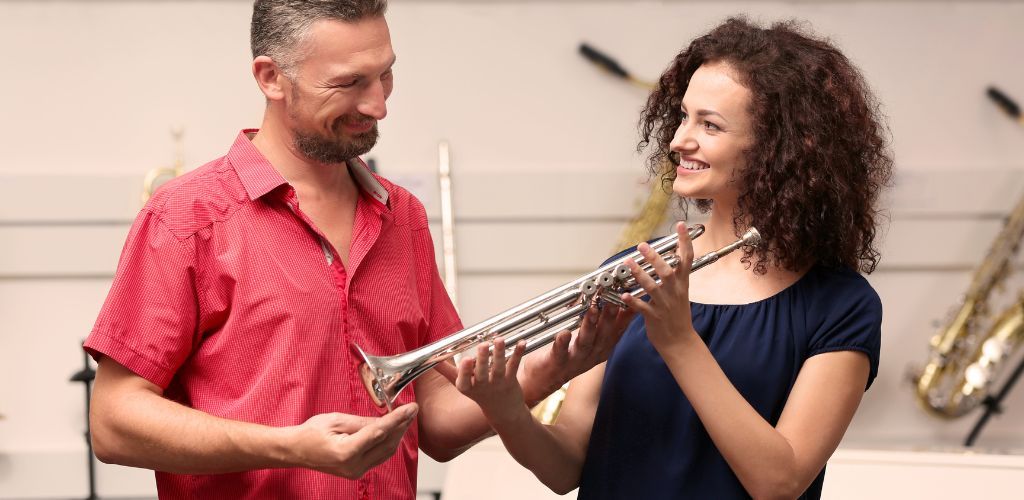
When I first decided to play the trumpet, I knew finding the right one was crucial.
For beginners, a B♭ trumpet is the standard and most comfortable type. It’s also the most widely used and versatile type, suitable for a variety of musical genres.
I also had to ensure the trumpet felt right in my hands, as different brands can have slightly different fits. It’s essential to choose a well-crafted instrument that’s durable and has good-quality sound; a reputable music store should offer options that suit your budget and needs.
Fundamental Techniques

Mastering the basic techniques early on made a world of difference for me. Creating sound on a trumpet starts with proper breath control and developing a stable embouchure—that’s how your mouth forms around the mouthpiece.
When I started, I quickly learned that daily practice was the key. I worked on the three valves individually, focusing on simple notes and scales to build my finger dexterity and overall playing confidence.
Listening to professionals and trying to emulate their sound helped my progress immensely.
Mastering advanced trumpet technique requires dedicated practice and a deep understanding of the intricacies of this musical instrument.
Playing the piano, with its vibrating strings and complex keys, presents different challenges, showcasing the diversity of musical instruments.
The trumpet and piano demand precision and skill, making them equally difficult to master. The ability to manipulate a vibrating drum head with finesse demonstrates the musician’s proficiency in understanding the nuances of percussion instruments.

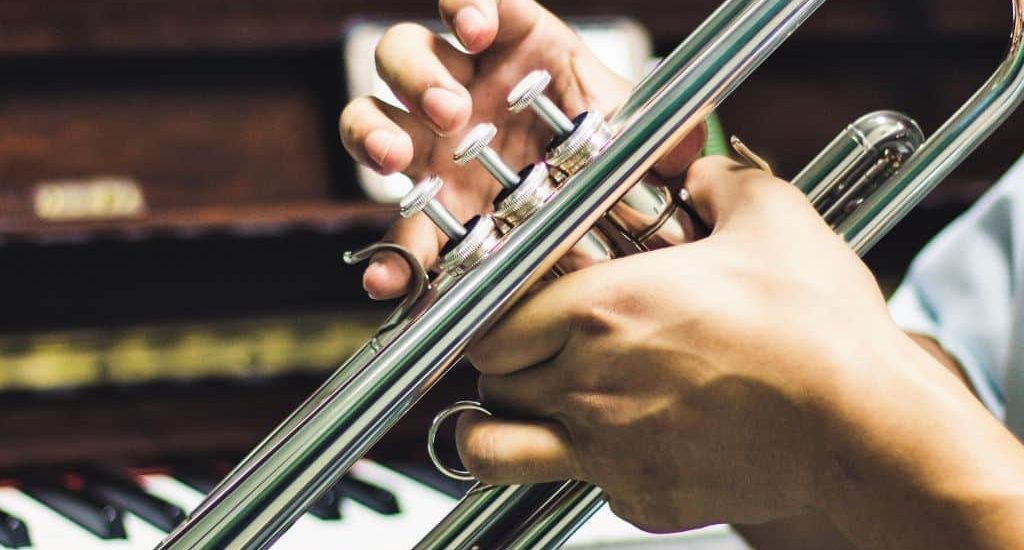
Trumpet Brands Recommendation
Yamaha YTR-2330
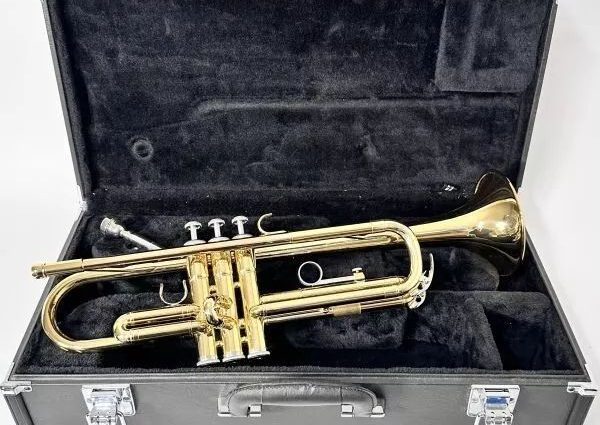
The Yamaha YTR-2330 is a well-crafted, standard Bb trumpet designed for students and intermediate players.
It features a yellow brass bell and bore, providing a balanced, rich tone suitable for various musical genres.
The trumpet’s durable construction, responsive valves, and comfortable handling make it an ideal choice for those seeking a reliable, high-quality instrument for practice, lessons, and ensemble performances.
Yamaha YTR2330 Student Trumpet

FEATURES:
Durable construction made of yellow brass
OTHER INFO: The Adjustable 3rd Trigger Ring Ensures A Comfortable Grip
- Comes with a gig bag and mouthpiece
- Register and enjoy a 5-year extended warranty and 3-month Tomplay Premium
- May be too pricey for beginner players
When you click ‘Check Price’, you’ll see there are loads of great places to buy this item. Our personal favorite is Sweetwater for the US, and Thomann and Gear4Music for the UK & Europe.
They are the largest music retailers, with excellent customer service, competitive prices, really fast shipping, and the longest guarantees.
The professional musician who wrote this article combined many things,
from the product build, manufacturer’s reputation through to feedback
from other users, to create our famous TedScore™.
Bach 180S37 Stradivarius Series
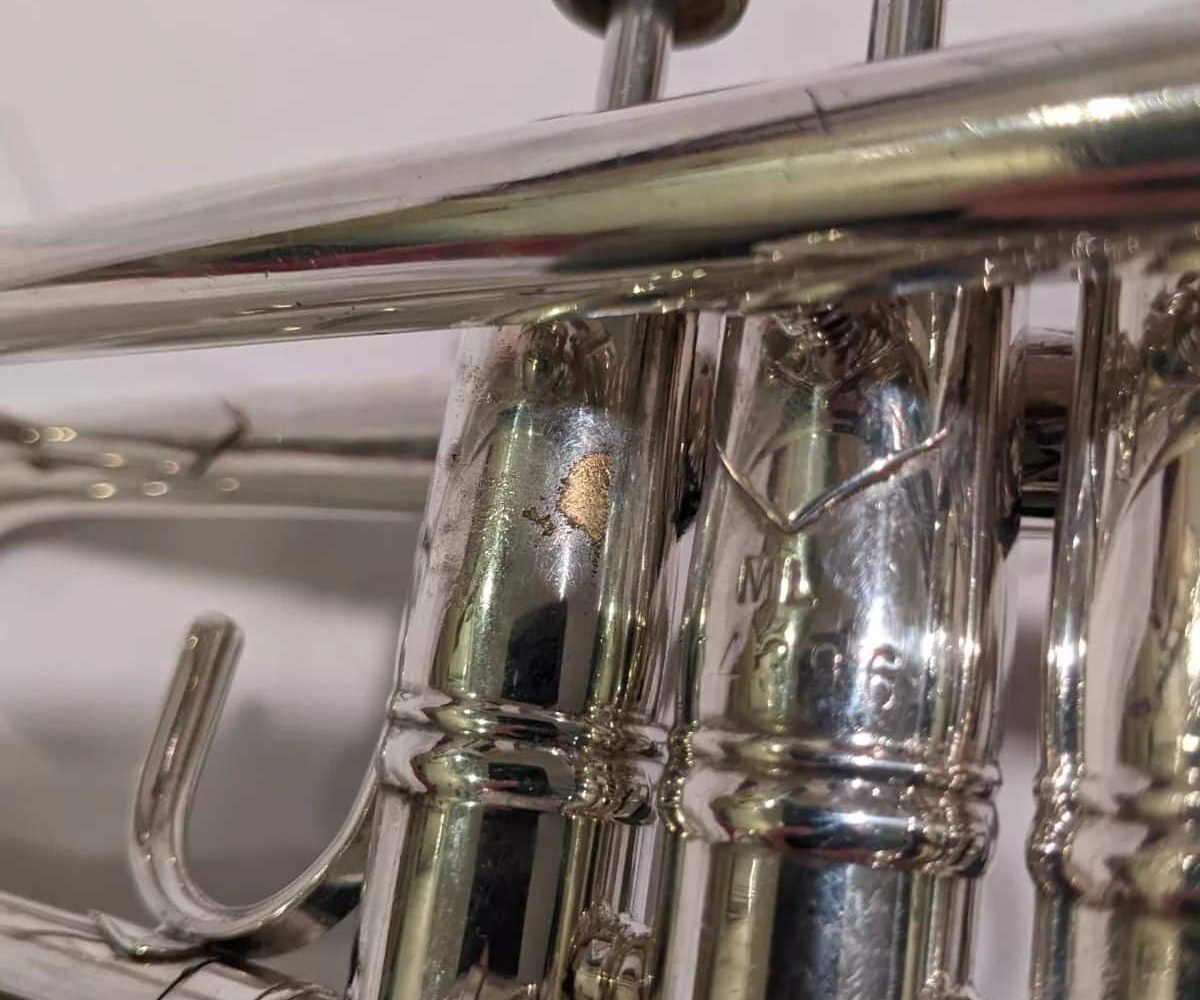
The Bach 180S37 Stradivarius Series is a premium line of trumpets known for their exceptional craftsmanship and rich, vibrant sound.
These instruments are meticulously handcrafted using the finest materials, ensuring unparalleled quality and consistency.
With their responsive valves, precise intonation, and stunning visual appeal, the Bach 180S37 Stradivarius Series trumpets are the go-to choice for professional musicians.
Bach Stradivarius 18037

FEATURES:
- One-piece hand-hammered bell for
an epic tone quality
- Monel alloy pistons for a
smooth and groovy action
- Large bore size for a
full and funky sound
- Produces a full and funky sound with excellent tonal quality
- Smooth and groovy action enables precise playing
- High-quality construction ensures reliable and consistent performance
- Comes with a higher price tag than intermediate or beginner-level trumpets
When you click ‘Check Price’, you’ll see there are loads of great places to buy this item. Our personal favorite is Sweetwater for the US, and Thomann and Gear4Music for the UK & Europe.
They are the largest music retailers, with excellent customer service, competitive prices, really fast shipping, and the longest guarantees.
The professional musician who wrote this article combined many things,
from the product build, manufacturer’s reputation through to feedback
from other users, to create our famous TedScore™.
King 2055 Silver Flair Intermediate Bb Trumpet
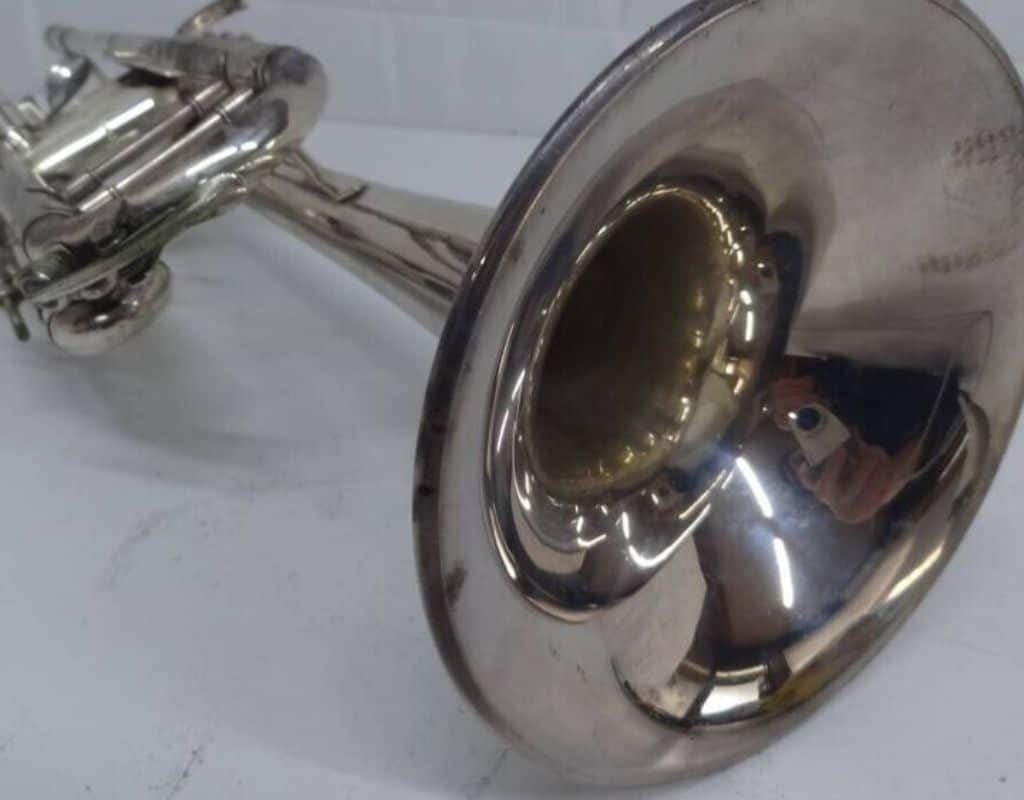
The King 2055 Silver Flair Intermediate Bb Trumpet is well-crafted for advancing students and intermediate players.
It features a .460-inch bore and a 4.8-inch bell, providing a balanced sound and easy playability.
The silver-plated finish and stainless steel pistons add durability and a touch of elegance to this reliable trumpet.
KING Trumpet-Standard, Silver (2055T)
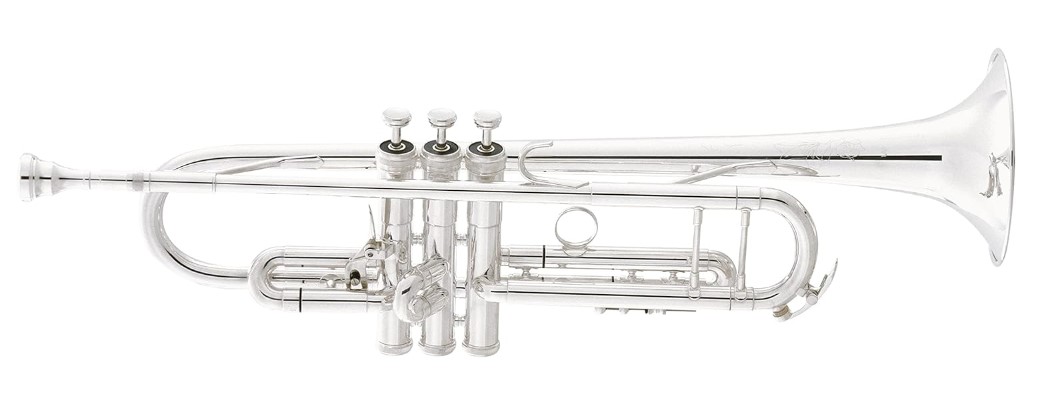
FEATURES:
- Medium-large bore for
a warm and rich sound
- Silver-plated finish for a
classic look and feel
- Produces a warm and rich sound with excellent tonal quality
- Classic and elegant appearance
- Affordable price point for a high-quality trumpet
- May not have as many advanced features as some other intermediate-level trumpets
- Silver plating may require more maintenance and upkeep than other finishes
When you click ‘Check Price’, you’ll see there are loads of great places to buy this item. Our personal favorite is Sweetwater for the US, and Thomann and Gear4Music for the UK & Europe.
They are the largest music retailers, with excellent customer service, competitive prices, really fast shipping, and the longest guarantees.
The professional musician who wrote this article combined many things,
from the product build, manufacturer’s reputation through to feedback
from other users, to create our famous TedScore™.
Overcoming
Common Challenges
Learning the trumpet comes with its fair share of hurdles, but I have some tips and tricks that might make the journey smoother. Keep your spirits and practice consistently; you’ll master this brass beauty before you know it!
Achieving the Correct Tone

Now, tone can be pesky, but paying close attention to your embouchure—how your mouth engages with the mouthpiece—is critical.
I’ve realized that relaxed lips and focused air make a more precise sound. It’s all about balance and control; too tense, and you’ll sound strained, too slack, and well, it’s just unsafe air.
Regular, mindful practice of long tones improves embouchure steadiness and tone quality.
Expanding Range and Flexibility

My go-to strategy is starting with mid-range notes and gradually venturing higher. Remember, hitting those high notes isn’t a sprint; it’s about building endurance and control over time.
I also like to sneak in flexibility exercises during practice, like lip slurs, to navigate between pitches without hiccups. Flexibility makes the trumpet less of an enigma and more like a friend you’re getting to know better daily.
Advancing Your Skills

Brass instruments, such as the trumpet, play a vital role in classical music, with trumpet players often taking center stage in orchestral performances. The trumpet’s distinctive sound lends a regal and majestic quality to classical compositions, making it a cornerstone of brass sections in orchestras.
The trumpet has a timeless appeal among musical instruments. It captivatingly captures audiences with its expressive melodies and commanding presence in classical music.
Enhancing my trumpet prowess means getting diverse with experience and exposure.
Playing in Ensembles
One of the first things I did was join a jazz ensemble. My skills leaped forward there as I navigated jazz’s exciting twists and turns.
Every rehearsal and gig with the band was a chance to fine-tune my timing and learn the subtle art of improvisation, a cornerstone of jazz that keeps my fingers and brain nimble!
I also auditioned for a classical orchestra, which was a game-changer.
Playing in an orchestra demands precision and a strong sense of harmony, which refined my ability to blend my sound with a larger group of musicians. The diverse repertoire expanded my technical aptitude and introduced me to waves of breathtaking classical pieces.


Exploring Musical Genres
Dabbling in different genres has made practicing way more fun.
Each style, from baroque to bebop, brings its own rules and freedoms. Embracing genres like classical and jazz has added variety to my practice routines and given me a rich library of tonal textures and breathing techniques to explore.
Jazz keeps me on my toes with its demand for on-the-spot creativity. Mastering the jazzy scales and soulful blue notes has given my playing that extra sparkle – a sort of musical sassiness.

I’ve noticed that every time I switch from one genre to another, I bring a piece of one into the other, which makes my performances stand out.
Additionally, the saxophone or clarinet player, skilled in the art of wind instruments, may also play the trumpet with proficiency, showcasing versatility across different musical domains. The ability to play trumpet adds depth and breadth to the musician’s repertoire, allowing them to explore diverse genres and musical expressions.
Performing and Competing
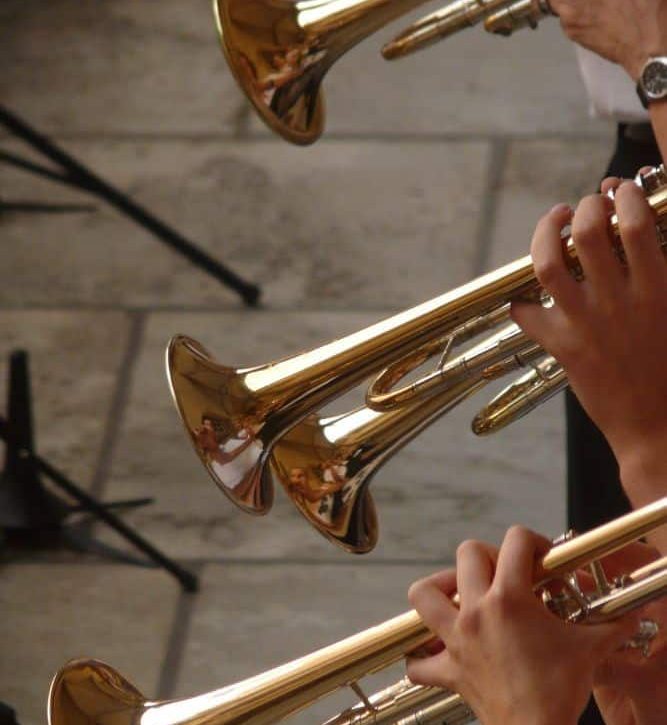
Nothing beats the rush of performing. Be it a cozy café or a grand auditorium, every performance teaches me something new about handling pressure and stage dynamics.
Competing, in particular, presents unique challenges; the tension can be as high as those thrilling high notes I chase after.
But every clap and cheer from the audience feeds my passion and tells me I’m advancing, note by glorious note. Participating in competitions also motivates me to polish my pieces to perfection, always striving to outdo myself.
Each concert, and each contest whisks me further up the ladder of musical excellence.
Is Trumpet Hard to Learn:
A recap

Mastering the trumpet is like tackling a feisty puzzle. It’s not just blowing into a brass pipe; it’s an art form that requires patience, practice, and a sprinkle of passion.
Anyone with determination can learn to play, though hurdles like braces or missing front teeth can be a bother initially.
Persistence is vital; with time, playing high notes becomes less of a chore and more of a thrill. Moreover, practicing regularly will iron out any initial wrinkles in tone and consistency.
On my journey, I’ve learned that with the right instructor and a jolly attitude, the trumpet is anything but impossible.
Trumpet learning is doable with a bit of grit.
Initial obstacles, like dental issues, can be navigated.
Regular practice turns difficulties into wins.
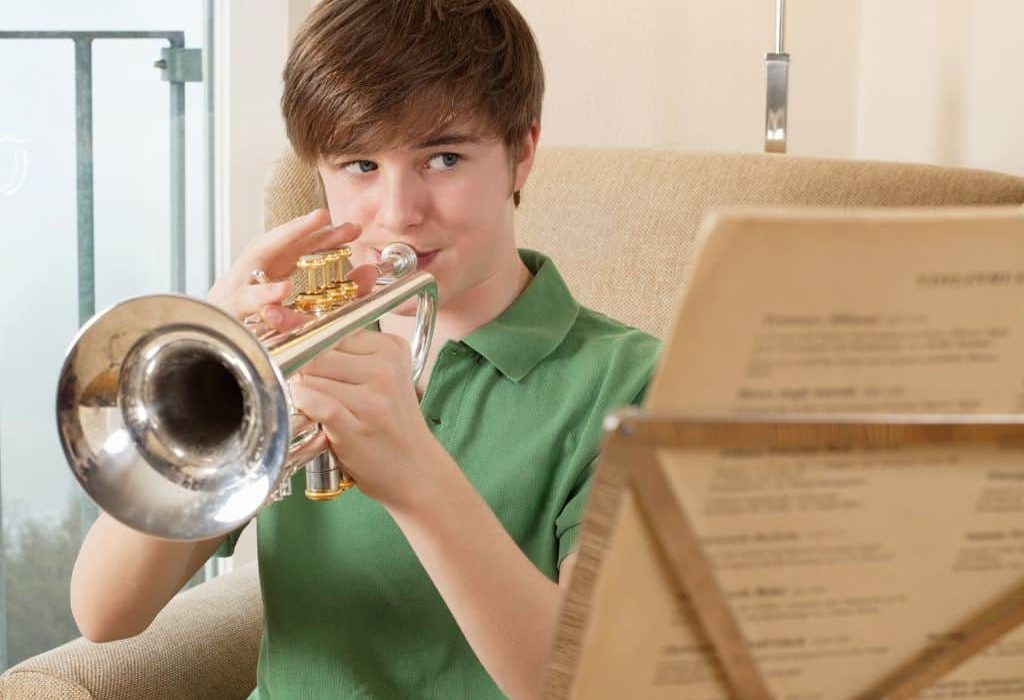
Lastly, we must always remember the most crucial bit: to have a blast! After all, what’s music without a dash of fun?
Before you go…
Explore this article to get an idea of the cost of trumpets and the factors that influence their prices. It’s a valuable resource for understanding the price range and considerations when purchasing a trumpet.
FAQ's
Learning the trumpet can vary in duration depending on factors such as practice consistency, prior musical experience, and individual learning pace. Generally, with regular practice and dedicated effort, beginners can start playing simple tunes within a few months, while being a professional trumpet player often takes several years of consistent training and learning.
The trumpet can be challenging for several reasons, including the physical demands on the embouchure (the muscles around the mouth and lips), the need for precise breath control, and the development of finger dexterity for playing complex musical passages. Additionally, mastering intonation, range, and articulation requires dedicated practice and a strong music theory and technique foundation.
Learning the guitar and the trumpet can be difficult, depending on individual preferences and physical abilities. Mastering the guitar involves developing finger dexterity, while the trumpet requires strong embouchure control and breath support.
While playing trumpet through self-teaching methods and online resources is possible, seeking guidance from a qualified instructor can significantly enhance your progress and help you develop proper technique and embouchure control. A skilled teacher can provide personalized feedback and instruction, leading to more effective and efficient learning.










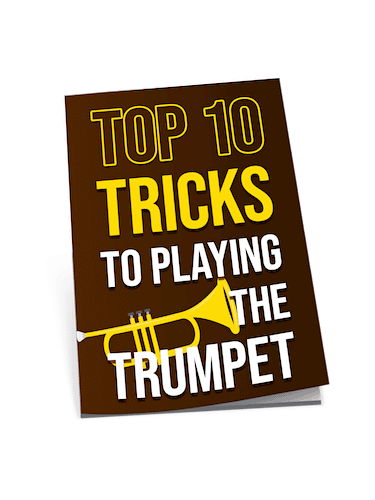
wondering how hard it’ll be to pick up trumpet after singing for years. any advice?
I appreciate the detailed outline on effective practice strategies, but there’s a component missing that could benefit others—incorporation of technology in practice routines. Many apps and digital resources can provide interactive learning experiences. Has anyone tried using smart music education apps in their routines?
Gotta say, practicing with a routine has changed the game for me. Before i was kinda all over the place, but setting aside time each day really makes a difference. Thanks for the tips, Cai Isfryn!
hey everyone, just started thinking about picking up the trumpet as a hobby. my kids are all grown and i’ve got some more time on my hands. this article’s great, but i’m wondering if there’s a particular brand or model that’s good for absolute beginners? cost is a bit of a concern but i wanna make sure im not buying something ill just have to replace in a year. any tips?
yamaha never disappoints honestly
Hi Marianne, a Yamaha YTR-2330 is a solid choice for beginners. Great value for the quality you get. Don’t worry too much about upgrading anytime soon if you go for it.